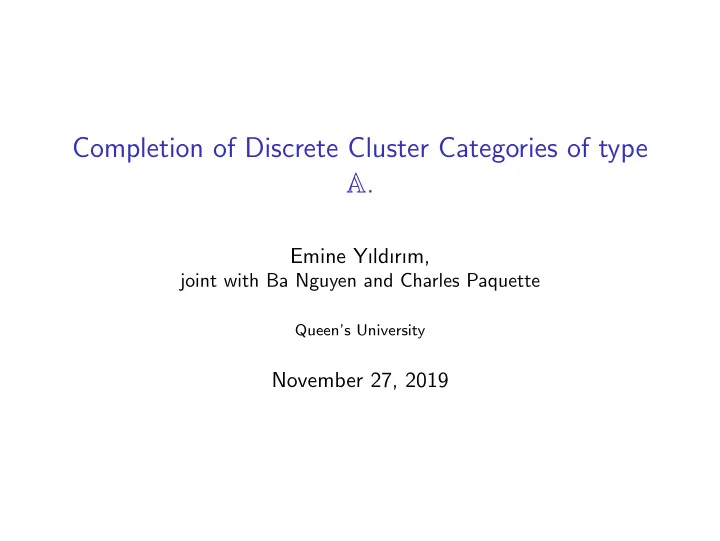

Completion of Discrete Cluster Categories of type A . Emine Yıldırım, joint with Ba Nguyen and Charles Paquette Queen’s University November 27, 2019
Setting ◮ M = a discrete set of infinitely many marked points with finitely many accumulation points ◮ acc ( M ) = a set of accumulation points which are two-sided.
Igusa-Todorov discrete cluster category of type A C ( S , M ) ◮ Indecomposable objects ↔ arcs between marked points in M ◮ Ext 1 ( X , Y ) � = 0 ⇔ ℓ X and ℓ Y cross.
m − m − m m ◮ C ( S , M ) is a Hom-finite 2-Calabi-Yau triangulated category. ◮ m �→ m − is a bijection in M . ◮ Let ℓ X : m − m ′ , then ℓ X [1] : m − − m ′− .
ℓ A ℓ B ℓ X ℓ Y ℓ D ℓ C ◮ X → A ⊕ C → Y → X [1] ◮ Y → B ⊕ D → X → Y [1]
A completion of C ( S , M )
◮ Replace each accumulation point z i by a closed interval i , z + [ z − i ] with marked points { z ij | j ∈ Z } where i , lim j → + ∞ z ij = z + lim j →−∞ z ij = z − i ◮ We obtain a new discrete cluster category C ( S ′ , M ′ ).
A subcategory D ◮ We let D be the full additive subcategory generated by the objects where both endpoints belong to an added interval. ◮ Then D is a triangulated subcategory.
Verdier quotient of C ( S ′ , M ′ ) ◮ Σ = { f : M → N | cone ( f ) ∈ D} . ◮ Σ is a multiplicative system compatible with triangulated structure. ◮ We have a quotient category C ( S ′ , M ′ )(Σ − 1 ) C ( S ′ , M ′ ) / D C := = ◮ C is a triangulated category.
Geometric description of C ( S , M ) ◮ Objects in C are the same as objects in C ( S ′ , M ′ ). ◮ ℓ X ∼ ℓ Y in ( S ′ , M ′ ) if ℓ X , ℓ Y become the same when we collapse all the added intervals. ◮ Morphisms are some equivalence classes of left fractions X → Z ← Y .
ℓ Z ℓ X ℓ X = ℓ Y ℓ Y ℓ W ℓ W C ( S ′ ,M ′ ) C
◮ Therefore, indecomposable objects correspond to arcs of ( S , M ). ◮ If a is an accumulation point, then a + = a . ◮ What is Hom ( X , Y ) in C ? Let X , Y be indecomposable objects in C . Then k , if ℓ X , ℓ Y cross; Hom ( X , Y [1]) = k , if ℓ X , ℓ Y share an acc. pt. and ℓ X → ℓ Y ; 0 , otherwise.
Example ℓ X ℓ W C
Cluster-tilting subcategories ◮ A full additive subcategory T of C is cluster tilting if (i) For X ∈ C , we have X ∈ T ⇔ Hom ( X , T [1]) = 0 ⇔ Hom ( T , X [1]) = 0 (ii) The subcategory T is functorially finite in C . ◮ We have a description of cluster-tilting subcategories for C .
Link with representation theory ◮ If T is cluster-tilting, then we have an equivalence C / T [1] ∼ = mod fp T .
a
Recommend
More recommend